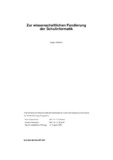Citation link:
https://nbn-resolving.org/urn:nbn:de:hbz:467-481Files in This Item:
| File | Description | Size | Format | |
|---|---|---|---|---|
| humbert.pdf | 2.38 MB | Adobe PDF |  View/Open |
| Dokument Type: | Doctoral Thesis | metadata.dc.title: | Zur wissenschaftlichen Fundierung der Schulinformatik | Authors: | Humbert, Ludger | Institute: | Fachbereich 12, Elektrotechnik und Informatik | Free keywords: | Schulinformatik, Didaktik der Informatik, Informatische Bildung | Dewey Decimal Classification: | 004 Informatik | GHBS-Clases: | TZM | Issue Date: | 2003 | Publish Date: | 2005 | Abstract: | Mit dem Modulkonzept wird eine Grundlage für die Schulinformatik entwickelt und evaluiert. Zur wissenschaftlichen Fundierung werden die Beziehungen zwischen Wissenschaftstheorie und Informatik herangezogen. Ergebnisse lerntheoretischer Forschungen beleuchten den Forschungsgegenstand aus der Perspektive des Lernens. Unter Berücksichtigung der Geschichte der Schulinformatik findet der aktuelle Stand der fachdidaktischen Forschungen Eingang in das Forschungsprogramm. Die empirische Untersuchung der Lehrexpertise von Informatiklehrerinnen gibt Aufschluss zu weiteren Gesichtspunkten, die im Forschungsprogramm berücksichtigt werden. Im Zentrum der Überlegungen steht die Fachwissenschaft Informatik und ihre Bezüge zum Schulfach Informatik. Auf dieser Basis wird das Modulkonzept entwickelt. Es stellt einen konstruktiven Vorschlag für den Informatikunterricht für die allgemein bildende Sekundarstufe II dar und umfasst die Module • Informatiksysteme verantwortlich nutzen, • Elemente der theoretischen Informatik, • informatische Modellierung. Die Prüfung des Konzepts erfolgt in drei Richtungen: 1. Durch exemplarische Studien bezüglich des Bildes der Informatik bei Schülerinnen wird eine Fassette des Forschungsgegenstandes näher ausgeleuchtet. 2. Das Konzept wird darüber hinaus durch die Anwendung zur Analyse verpflichtenden Informatikunterrichts in der Sekundarstufe I und 3. als gestaltungsleitender Konstruktionshintergrund zur Erstellung von Informatiksystemen als Lernhilfen für den Informatikunterricht geprüft. Es wird gezeigt, dass die entwickelte Grundlage nicht nur als Konstruktionsleitender Hintergrund für den Informatikunterrichts geeignet ist, sondern darüber hinaus sowohl zur Analyse des Informatikunterrichts beitragen und nicht zuletzt Hilfestellung bei den Anforderungen zur Gestaltung von Informatiksystemen für den Einsatz im Unterricht bieten kann. Als Folgerung aus der erfolgreichen Prüfung des vorgestellten Konzepts wird eine Reihe von offenen Fragestellungen ausgewiesen, die über den Informatikunterricht in der allgemein bildenden Sekundarstufe II hinausweisen. The modular approach as presented in this paper is a viable basis for teaching and assessing informatics in secondary schools. The complex relations between the general theory of science and informatics help to give the modular approach a valid scientific foundation. The subject matter is further elucidated by empirical data and research taking into consideration the learners’ point of view. A closer look at the history teaching informatics at secondary level makes it possible to include the current discussion of how to teach informatics in this research program. A second source is the set of reports based on the informatics teaching experience of members of staff. They are included in this project, too. Hence the focus of this paper is on the relationship between informatics at university and secondary school level. It is the basis for the modular approach. The modular approach is a practical suggestion for teaching IT to advanced students at secondary schools. It is comprised of three modules • the responsible use of informatics resources • elements of theoretical informatics • modelling informatics systems This modular approach is assessed in three different ways: 1. One aspect of the subject matter is the students image of informatics. This is illustrated and exemplified by a sample. 2. A second aspect is the issue of introducing informatics as a requirement in years 5-10 at secondary schools. 3. Finally by developing guiding principles as teaching aid for informatics in secondary schools. The objective of this paper is threefold. It argues that the modular approach is a viable background for teaching informatics. It also provides a framework for planning and assessing informatics lessons as well as integrating informatics resources for classroom use. The successful verification of the modular approach opens the way for further questions and key issues that need to be looked at more carefully in future research. They are of a more general nature and go well beyond teaching informatics at secondary school level. |
URN: | urn:nbn:de:hbz:467-481 | URI: | https://dspace.ub.uni-siegen.de/handle/ubsi/48 | License: | https://dspace.ub.uni-siegen.de/static/license.txt |
| Appears in Collections: | Hochschulschriften |
This item is protected by original copyright |
Page view(s)
828
checked on Nov 25, 2024
Download(s)
510
checked on Nov 25, 2024
Google ScholarTM
Check
Items in DSpace are protected by copyright, with all rights reserved, unless otherwise indicated.

